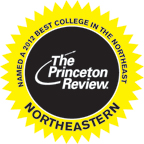 Clark University is one of the nation’s best institutions for undergraduate education, as recognized by The Princeton Review in its newly released college guidebook, “The Best 376 Colleges: 2012 Edition.” Clark is also among the institutions deemed “Best in the Northeast.”
Clark University is one of the nation’s best institutions for undergraduate education, as recognized by The Princeton Review in its newly released college guidebook, “The Best 376 Colleges: 2012 Edition.” Clark is also among the institutions deemed “Best in the Northeast.”
The guidebook, which includes only about 15 percent of America’s 2,500 four-year colleges, includes detailed profiles of each institution along with ratings for each school in eight categories. The lists are based on surveys of 122,000 students (an average of 325 per campus) at the 376 schools in the book. The surveys, conducted during the 2010-11 and/or previous two school years, asked students about their school’s academics, administration, campus life, student body, and themselves.
In the University’s profile, students say Clark is “an academically rich, research-oriented,” small liberal arts school. … The research opportunities here are endless.” A psychology major says, “Clark goes out of its way to provide students with as many opportunities as possible to be involved with their field.” Additionally, “The professors are always involved in their fields, and they know where to direct the students.”
The Princeton Review recommends 220 institutions in its “Best in the Northeast” feature, posted Aug. 1 on its website, under “2012 Best Colleges: Region by Region.”
The Princeton Review does not rank the colleges in its “2012 Best Colleges: Region by Region” list hierarchically or by region or in various categories. However, “The Best 376 Colleges: 2012 Edition” book does include ranking lists of “top 20 colleges” in 62 categories, and some of the institutions in the regional lists may also appear in the top 20 lists.
The Princeton Review is headquartered in Framingham, MA, with editorial offices in New York City and test preparation locations across the country and abroad. It is not affiliated with Princeton University and it is not a magazine.
Since its founding in 1887, Clark University in Worcester, Mass., has a history of challenging convention. As an innovative liberal arts college and research university, Clark’s world-class faculty lead a community of creative thinkers and passionate doers and offer a range of expertise, particularly in the areas of psychology, geography, Clark is nationally recognized for psychology, geography, management, urban education, Holocaust and genocide studies, environmental studies, and international development and social change. Clark’s students, faculty and alumni embody the Clark motto: Challenge convention. Change our world.
